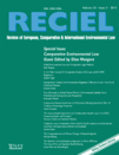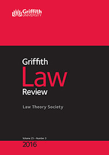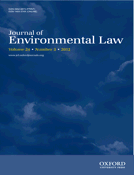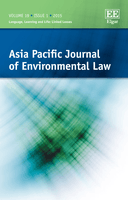
HARVARD ENVIRONMENTAL LAW REVIEW
Scope & Guideline
Illuminating the Path of Environmental Justice
Introduction
Aims and Scopes
- Environmental Justice:
The journal consistently addresses issues of environmental justice, highlighting the disproportionate impact of environmental policies on marginalized communities and advocating for equitable legal frameworks. - Climate Change Litigation:
A significant focus is on legal strategies surrounding climate change, including litigation aimed at holding corporations accountable for environmental harm and exploring legislative solutions for climate resilience. - Regulatory Frameworks for Environmental Protection:
The journal explores the efficacy and limitations of current regulatory frameworks, such as the Clean Air Act and the Endangered Species Act, analyzing how these laws adapt to emerging environmental challenges. - Indigenous Rights and Resource Management:
It includes discussions on the intersection of indigenous rights and environmental law, particularly how traditional ecological knowledge can inform sustainable resource management. - Technological Innovation in Environmental Law:
The journal examines the legal implications of technological advancements in environmental management, including clean technologies and geoengineering.
Trending and Emerging
- Integration of Environmental Justice in Legal Frameworks:
There is a growing emphasis on integrating environmental justice principles into legal frameworks, highlighting the need for laws that address systemic inequalities in environmental protection. - Innovations in Climate Liability:
The rise of climate liability as a legal concept is gaining traction, with more discussions on how to hold corporations accountable for their contributions to climate change and environmental degradation. - Impact of Technological Advancements on Environmental Law:
Emerging discussions about how technological advancements, like electric vehicles and geoengineering, are reshaping environmental law and policy frameworks, signaling a trend towards adaptation and innovation. - Indigenous Perspectives in Environmental Governance:
Increasing attention is being paid to indigenous perspectives and rights within environmental governance, reflecting a broader trend towards inclusivity and respect for traditional ecological knowledge. - Legal Responses to Environmental Emergencies:
The journal is increasingly focusing on legal responses to urgent environmental emergencies, such as climate crises and natural disasters, indicating a shift towards more immediate and impactful legal strategies.
Declining or Waning
- Traditional Resource Extraction Issues:
Discussions surrounding conventional resource extraction, such as oil and gas, appear less frequently, possibly indicating a shift towards renewable resources and sustainability as primary concerns. - General Environmental Indifference:
The theme of environmental indifference, while still relevant, has seen reduced coverage as the journal pivots towards more proactive legal strategies and frameworks that address urgent environmental justice issues. - Static Regulatory Critiques:
Critiques of existing regulations without proposing innovative legal solutions are less common, as the journal emphasizes actionable legal reforms and adaptations to evolving environmental challenges.
Similar Journals

DUKE LAW JOURNAL
Illuminating the path of legal innovation.DUKE LAW JOURNAL is a premier scholarly journal published by Duke University, dedicated to advancing the field of law through rigorous research and critical analysis. With an ISSN of 0012-7086 and an E-ISSN of 1939-9111, this distinguished journal has established itself as a vital resource for legal scholars, practitioners, and students alike. As a member of the top quartile (Q1) in Law for 2023 and ranking 267 out of 1025 in the Scopus database, the journal showcases high-impact articles that contribute to the contemporary discourse on legal theory, practice, and reform. While it does not currently offer open access, its rich archive since 1978 provides invaluable insights into significant legal developments in the United States and beyond. The DUKE LAW JOURNAL serves not only as a repository of knowledge but also as a forum for diverse perspectives, making it an essential tool for anyone engaged in the legal profession or academia.

International Environmental Agreements-Politics Law and Economics
Empowering research to shape impactful environmental agreements.International Environmental Agreements-Politics Law and Economics, published by SPRINGER, is a leading journal dedicated to exploring the intersection of economics, law, and political science as they relate to international environmental agreements. With impressively high rankings in its respective categories—Q1 in Economics and Econometrics, Law, and Political Science and International Relations—this journal serves as a critical platform for rigorous scholarly discourse, addressing pressing global challenges and fostering understanding among policymakers and academics alike. The journal is indexed with an E-ISSN of 1573-1553 and maintains a strong presence in Scopus, excelling in multiple disciplines (ranked #40 in Law, #39 in Political Science, and #128 in Economics). Despite being a subscription-based journal, its comprehensive analyses and innovative perspectives make it an invaluable resource for researchers, professionals, and students committed to advancing sustainable environmental governance. Established in 2003, the journal continues to contribute to the field with engaging content that encourages interdisciplinary collaboration and furthers the study of international environmental treaties.

Review of European Comparative & International Environmental Law
Bridging disciplines for a greener tomorrow.Review of European Comparative & International Environmental Law is a leading academic journal published by WILEY that serves as a vital platform for scholars and practitioners in the fields of environmental law, geography, and policy analysis. With its ISSN 2050-0386 and E-ISSN 2050-0394, it provides comprehensive insights into the comparative and international aspects of environmental legislation and governance. The journal is noted for its rigorous peer-review process and has achieved commendable rankings, including Q1 in Law and Q2 in Geography, Planning, and Development in the 2023 category quartiles. Furthermore, it holds impressive Scopus rankings, placing it within the 92nd percentile for social sciences law. The scope of the journal encompasses interdisciplinary research addressing contemporary environmental challenges, making it an invaluable resource for those engaged in the development, monitoring, and policy-making around environmental law. Published since 2013 and continuing through 2024, Review of European Comparative & International Environmental Law plays a crucial role in fostering scholarly dialogue and influencing environmental policy worldwide, ensuring access to state-of-the-art research and innovative solutions for a sustainable future.

Griffith Law Review
Fostering a deeper understanding of law, locally and globally.Griffith Law Review is a distinguished academic journal dedicated to the exploration and discussion of contemporary legal issues, established as a key resource for scholars, practitioners, and students in the field of law. Published by Routledge Journals, Taylor & Francis Ltd, this journal features a diverse range of articles that reflect rigorous theoretical and empirical research, contributing significantly to the legal scholarship landscape. With an impressive Q2 ranking in Law for 2023, it maintains a robust commitment to advancing legal discourse and fostering a deeper understanding of both domestic and international legal frameworks. While currently not offering Open Access options, the journal is available for subscription and is indexed in prominent databases, ensuring wide visibility among legal academics and professionals. The Griffith Law Review, covering converged years from 2003 to 2006 and from 2008 to 2024, is essential for anyone looking to engage with cutting-edge legal theories and practices.

JOURNAL OF ENVIRONMENTAL LAW
Advancing the discourse on environmental justice.JOURNAL OF ENVIRONMENTAL LAW, published by Oxford University Press, is a premier academic journal that has been at the forefront of environmental legal scholarship since its inception in 1989. With an impactful focus on the intersection of law and environmental policy, this journal is recognized for its contributions to the understanding of legal frameworks governing environmental issues. The journal holds a distinguished position in the academic community, ranking in the Q1 category for Law and Q2 for Management, Monitoring, Policy and Law as of 2023, indicating its significant influence and reach. It currently holds the impressive Scopus ranks, with a percentile of 85th in social sciences law, reflecting the high citation impact of its published research. The Journal of Environmental Law serves as an essential resource for researchers, legal practitioners, policymakers, and students alike, providing robust analysis and discussion on pressing environmental legal challenges. Although it does not offer open access, the journal ensures broad dissemination of its content through various academic platforms, solidifying its role in advancing knowledge and policy in the field of environmental law.

Derecho PUCP
Fostering innovative scholarship in law.Derecho PUCP is a distinguished open access journal published by the Pontificia Universidad Católica del Perú, specifically from the Faculty of Law. With a commitment to advancing legal scholarship, this journal has been an essential resource in the field of law since 2005, providing researchers, practitioners, and students with access to critical analyses and discussions on various legal topics. Based in Lima, Peru, Derecho PUCP holds a prestigious position with a Q2 ranking in the Law category, reflecting its impactful contributions to the social sciences, particularly in the legal domain. The journal publishes cutting-edge research and promotes innovative discourse, aiming to foster academic excellence and engage with contemporary legal challenges. As it continues to converge into its future issues from 2019 to 2024, Derecho PUCP exemplifies a vital platform for those committed to the pursuit of legal knowledge and research.

Asia Pacific Journal of Environmental Law
Empowering Scholars to Shape Environmental PolicyAsia Pacific Journal of Environmental Law, published by EDWARD ELGAR PUBLISHING LTD, serves as a vital platform for disseminating scholarly research in the field of environmental law within the Asia Pacific region. With an ISSN of 1385-2140 and an E-ISSN of 1875-8258, this journal primarily focuses on the intersection of environmental legislation, policy, and management practices, providing critical insights and analysis to enhance understanding and application of environmental law. Although it holds a Q4 ranking in the 2023 category of Management, Monitoring, Policy and Law, the journal's commitment to advancing knowledge and discussions surrounding pressing environmental issues remains strong. Converging insights from various years, the journal captures a range of developments and scholars' perspectives that address regional environmental challenges, making it a relevant resource for researchers, professionals, and students alike. While the journal currently does not offer open access options, its rigorous peer-reviewed process ensures the dissemination of quality research that contributes to the broader dialogue on environmental protection and policy development in this dynamic and critical field.

Desenvolvimento e Meio Ambiente
Exploring the intersection of development and ecology.Desenvolvimento e Meio Ambiente is a pioneering open-access journal published by Universidade Federal do Paraná, Editora, committed to advancing knowledge in the fields of Environmental Science and Geography. Established in 2000, this Brazilian journal serves as a vital platform for researchers, professionals, and students to share interdisciplinary studies that address the pressing environmental challenges faced in both local and global contexts. With an E-ISSN of 2176-9109, this journal is particularly significant given its current quartile rankings of Q4 in Environmental Science (miscellaneous) and Geography, Planning, and Development in 2023. Although it has a modest impact factor reflected by its Scopus ranks—691/821 and 206/233 within their respective categories—the journal is dedicated to elevating the discourse surrounding sustainable development practices. With a convergence period extending from 2018 to 2024, Desenvolvimento e Meio Ambiente is an essential resource for anyone invested in the intersection of environmental studies and social sciences, fostering a community of inquiry and collaboration amidst Brazil's unique ecological landscape.

ALBERTA LAW REVIEW
Fostering dialogue on contemporary legal challenges.ALBERTA LAW REVIEW, published by the University of Alberta, stands as a key academic journal in the field of law, contributing to the discourse on legal issues and developments in Canada and beyond. With an ISSN of 0002-4821 and an E-ISSN of 1925-8356, this journal has been pivotal since its inception in 1974, providing a platform for legal scholarship that spans a diverse range of topics, from constitutional law to social justice. Although it operates under a traditional subscription model, the journal's illustrious history and rigorously peer-reviewed content affirm its stature in advancing legal research and education. The Alberta Law Review not only serves as a resource for academics and students, but also offers legal practitioners critical insights and analysis pertinent to contemporary legal challenges. With a commitment to enlightening the discourse around law, it is an invaluable asset for anyone engaged in the legal profession or related fields.

NATURAL RESOURCES JOURNAL
Shaping the future of natural resource management through scholarship.Welcome to the NATURAL RESOURCES JOURNAL, a scholarly publication dedicated to the intersection of law and environmental sciences. Published by the University of New Mexico School of Law, this journal has been a crucial platform since 1977 for scholarly discussions and research that shape our understanding of natural resources management and policy. With an impressive impact factor in the realm of law, ranking in the top 60th percentile, and recognized in the Environmental Science category, it serves as an essential resource for researchers, professionals, and students alike. Although not an open-access journal, it provides in-depth analyses and original research that are pivotal in addressing pressing environmental issues. Our objective is to foster interdisciplinary dialogue and enhance legal frameworks related to natural resource management, ensuring a sustainable future through informed policy-making. Join our community of scholars in exploring the multifaceted challenges and innovations in the field.